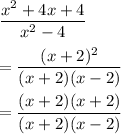Answer:
The restrictions on domain are are:

Explanation:
We are given the following information in the question:
We are given an expression:

Simplifying the given fraction, we have,

The domain is basically collection of all values of x such that the expression is defined.
We need to make sure that the denominator is not equal to zero for the given fraction.
Thus,

Hence, the restrictions on domain are are:
